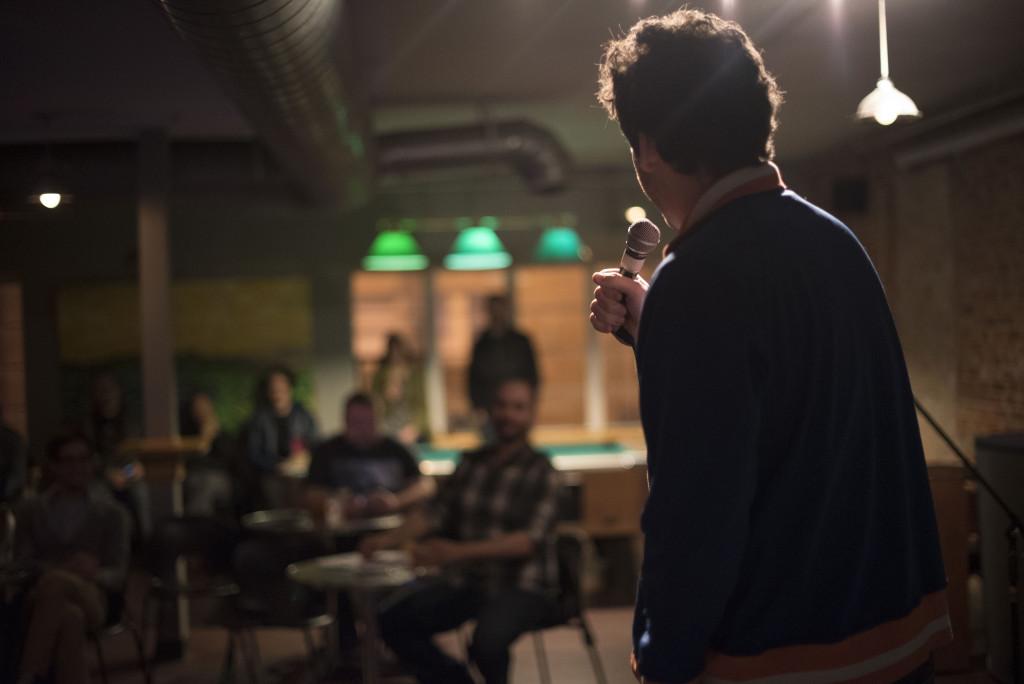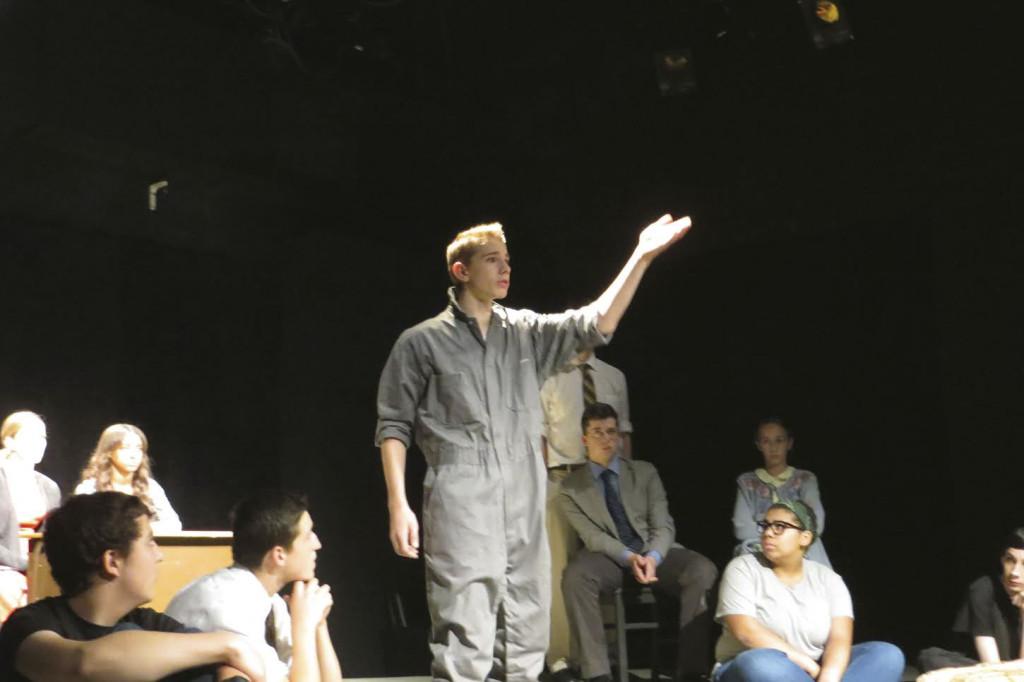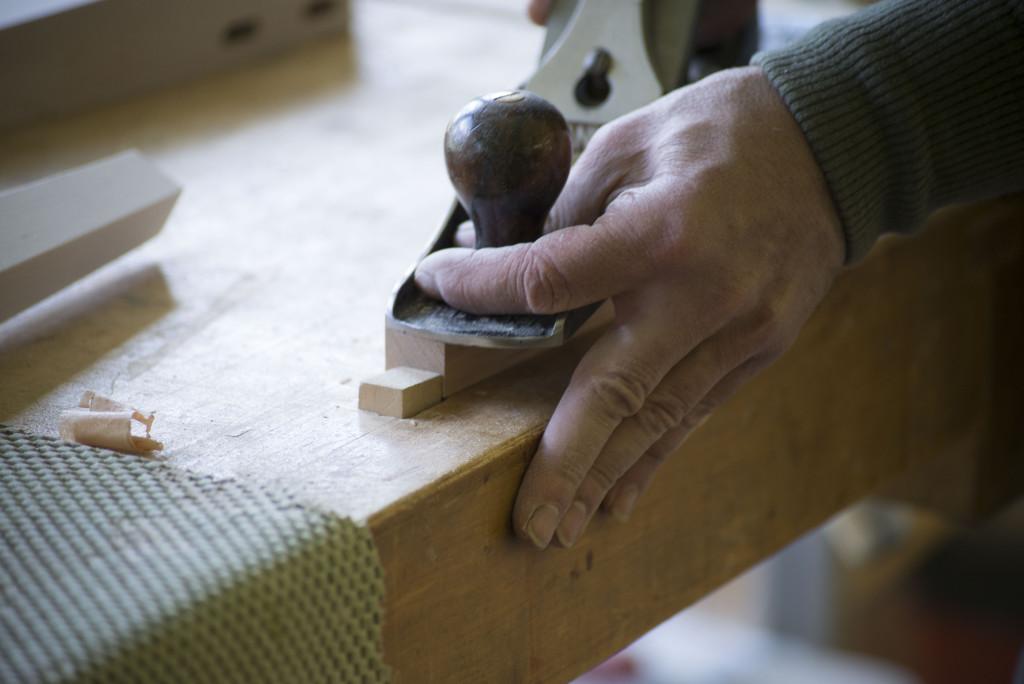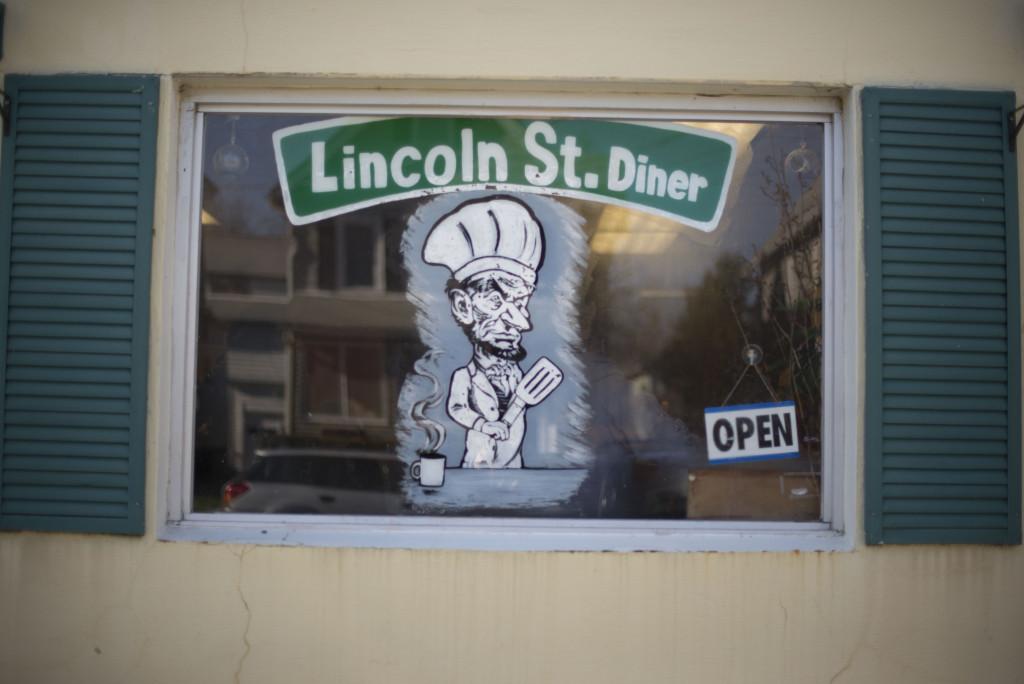Tom paces under the stage light with an air of fear. His posture tense, his eyes searching. His left arm is set stiffly in his pocket, his right arm juts out unnaturally, holding the microphone, like he doesn’t remember how he’s supposed to position his limbs.
Words are tumbling out of his mouth. “The worst thing you want in the world is people who give a fuck about you, you know?” He pauses. “The last thing you want,” he corrects himself, “the last thing you want is people, uh, is people who are gonna be …”
[block]He trails off.
“Now …”
Silence.
Eleven seconds of silence.
Eleven seconds that feel like an hour.[/block]
Not even two minutes into his set and he loses all momentum. He’s the only one that night who didn’t bring notes on stage.
With pleading eyes, Tom searches through his mind for something, anything to say. He brings his voice back awkwardly, fumbling through a childhood memory about being made fun of for his last name, Hand.
A heckle shoots out from one of the drunker attendees in the back of the dark room.
“Give me some hand!” he slurs with enthusiasm, laughing at his wit.
“Yeah, that’s right, that’s right, I haven’t heard that one before,” Tom shoots back timidly. “Why don’t you come up here and—”
Cut off by an uproar from the heckler and others, as if a fight is about to break out in the dark club.
“He’s on next!” shouts someone else.
A group in the back starts another round of pool, the sharp percussion of cues on balls, balls clacking against one another.
Tom regains his footing after a few seconds of clatter and continues rambling through stories with no real direction or punchlines, dotted by a few scattered heckles and occasional laughs.
He cuts off a story that’s going nowhere, waving his white flag.
“Well that’s about my time,” he says with no enthusiasm and a look of defeat, “‘Cause, uh, well that’s as close as I’ve come without bombing, so thank you very much.”
Applause and cheers shimmer around the room. Regardless of success, regardless of quality, regardless of laughs, heckles or silence, everyone at the Ithaca Stand-Up Comedy Open Mic claps.
One-handedly, Tom attempts to finagle the mic into its stand to no avail, until the host Ruben saves him the trouble, gliding to the stage area with a Pabst Blue Ribbon draft and small spiral notebook in hand.
“Keep it going for Tom H. everybody!” he says into the mic, putting down his notebook.
He brings up his left hand and starts speaking: “You know, um,” quickly realizing his hand is occupied by a beer and not a microphone. He rolls with it, bringing the crowd around and earning some honest laughs.
“You know guys, comedy is more of an art than a science.”
***
A group of comedy stage regulars mingle by the bar, waiting for Ruben to arrive, while the gray-haired members of the band that just finished playing pack up their drums and guitars.
Ruben Arce, the short-haired and always-animated producer, has kept the Ithaca stand-up comedy scene alive for almost three years. He hosts shows every second and fourth Wednesday of the month on the second floor of the club Lot 10.
There isn’t a bad seat in the house because the house is about the same size as a standard public school classroom, although the chairs are a little more comfortable and the people doing the speaking are more obvious about their drinking habits.
As Ruben arrives, moving up the ramp to the bar area, he talks amiably with fellow comic Eric Turner, who helped establish the Ithaca Stand-Up Comedy Open Mic back when it started at the Pixel Lounge in 2012, just a 20-minute walk away.
On a white piece of paper, Ruben scrawls out the numbers one through 15, leaving it on the bar with his pen. With drinks in hand, comics gather, to one by one, write their names next to the numbers — the order for the night.
On the other end of the short, glossy bartop, a tattooed man sits in a leather jacket, his back turned to the group. Bridging his shoulders in sewed-on red lettering: “Ithacunts.” He and his two bar buddies move to the back of the stage area and pick up pool cues.
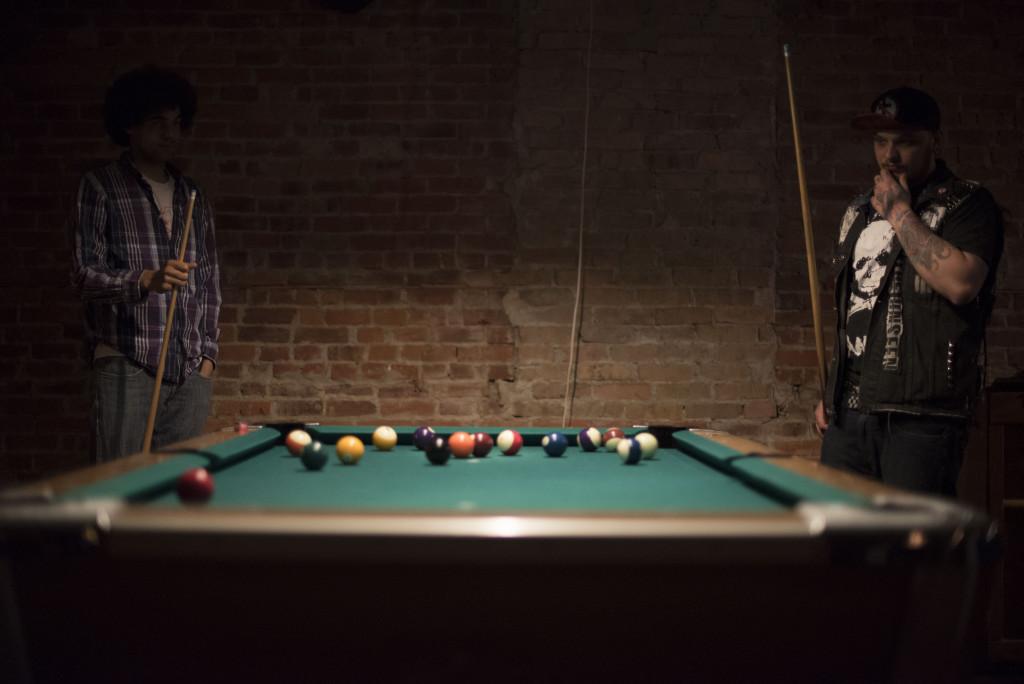
The occasional crack of pool balls emanates from the bright corner adjacent to the stage. Three green-shaded lights hover above the impossibly green felt. Underneath is faux-wood paneling, its angularity and smudgy titanium moulding is reminiscent of the early ’90s.
The rest of the lights dim, creating a fight for attention between the pool table and the slightly raised stage. Framing the microphone stand, the number 10 is outlined in fat, white strokes on the two walls forming the corner. A Pacman/Galaga arcade cabinet in the corner opposite the stage blinks timidly with life, a brilliant array of yellows, blues and pinks from the ’80s left brooding in the dark shadows by the non-insulated windows.
The comics walk down to the seats in front, setting down drinks, notebooks, phones and pens on the small metallic tables. One has a small spiral notebook and a Long Island iced tea in a short, octagonal glass. At the same table, Eric takes a drink from his Cascazilla draft, brewed locally. He sets it down next to his large, blue notebook, stuffed with pages of material. To his disappointment, he’s up first tonight.
As the crowd begins to gather at the tables and along the back walls, Ruben steps up to the microphone in a plaid button-down, the stage lights glinting off his thick-but-small hoop earrings.
“Just checking to make sure the sound is good. Can you guys hear me OK?”
The comics up front nod.
“Is the back OK? Ogusto, can you hear me back there?”
Ogusto, sitting on a couch against the windows, says yes.
“Great. We’re probably gonna start in about 10 minutes.”
Ruben steps out of the light and arranges himself and several loose pieces of paper at one of the tables up front.
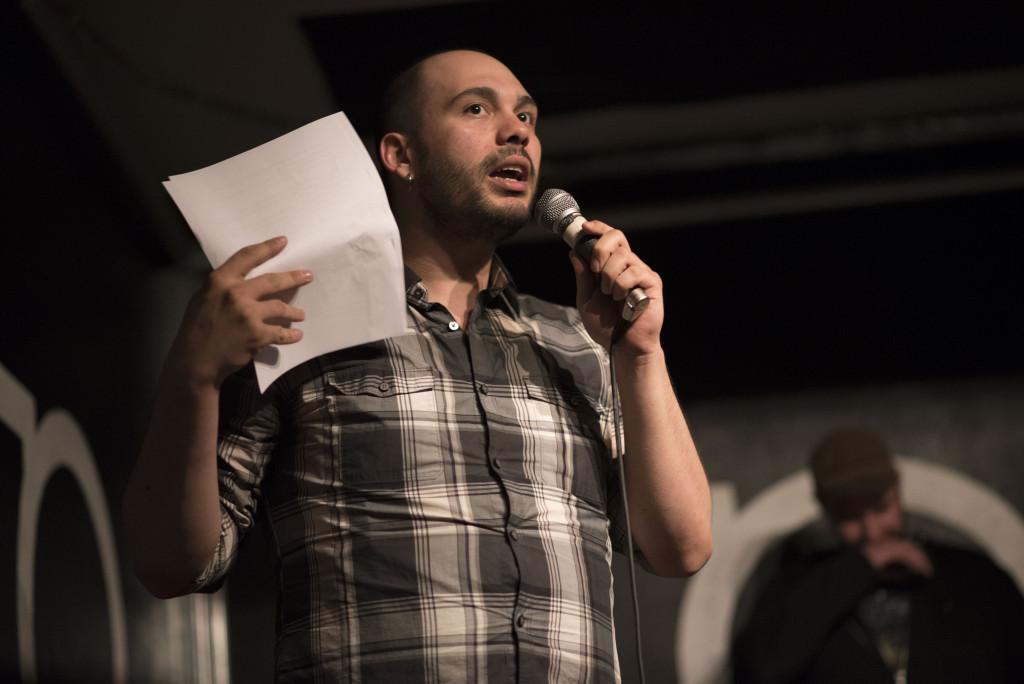
In 2012, Ruben did stand-up in New York City for the first time, just six months after he began producing the Ithaca Stand-Up Comedy Open Mic. He visited his sister in the Bronx, bunking down in her basement with her husband’s collection of nerdy knick knacks, “Dungeons & Dragons” books and high-end computer.
He performed at two open mics, the first at the New York Comedy Club, the next at the 99 Club. They were abysmal showings, with almost nobody but other comedians in the audience. His jokes went over well though.
Later that night on his brother-in-law’s computer, he was looking up different open mics to go to on BadSlava.com, the Craigslist of comedy. He received an email from Clayton Fletcher, director of new talent at the New York Comedy Club.
His friend and fellow comedian, Anna Phillips, managed to get him booked at a non-open mic comedy show on Saturday, just two days away. When Ruben received the email, he was overcome with weepy excitement.
Booked for a show in the Mecca of stand-up comedy.
He started inviting all eight friends and acquaintances he knew in New York City. But, in his teary-eyed joy, he missed a large section of the email, describing what he would come to learn was a bringer.
You will be asked to invite friends and family to see your performance.
Not an unreasonable request. But it continued.
You must have people in the audience in order to get onstage. If you have three people, you will receive 6–7 minutes of stage time. If you have more than that you will also be paid $5 for each person. If you have more than nine people in the crowd, you will receive a guaranteed ten-minute time slot as well as a free video of your performance.
To get 4 minutes on the mic, performers have to insure the club gets $30 plus the cost of four mandatory drinks. A bringer. Pay-to-play.
When Saturday night came around he took the subway down to the New York Comedy Club, situated on East 24th Street. It was four days after Christmas and snowing on and off. He joined Anna at an Irish pub around the corner. He ordered a double whiskey sour. She ordered a bucket of miniature Bud Light Limes.
When they made their way to the bar area of the comedy club, Ruben nursed two more whiskey sours, his heart racing.
As people came through the glass door paying their $15 admittance, guys with clipboards asked them who they were there to see to make sure nobody snuck into the lineup without getting some money into the coffers. Lucky for Ruben, Anna asked the clipboards to give him two of her attendees, which afforded him 4 minutes of stage time.
We ask that you prepare and memorize your set ahead of time. This is not an open mic, so notebooks, cue cards etc. are not appropriate for this show.
At other comedy shows in the city, the crowds are full of jaded comedians who just want to do their set and leave.
The same rules don’t apply in Ithaca.
On a night with a particularly long lineup, Geno Vicario signs up last on Ruben’s paper. For over a year he has been writing down funny things he thinks of, coming up with jokes and writing material. Comedy is something he has wanted to do since he was a teenager, and tonight he wants to scratch it off his bucket list.
As the night draws on past Tom and some regulars, and a couple strong drinks down the hatch, his mind gets a little slow.
I’m not gonna remember anything.
The longer the night goes, he loses more and more confidence in his material. Over a dozen comedians perform before it’s his turn. He can’t do it tonight. He leaves.
A few weeks later, Ruben announces a theme night on Facebook, the second theme night ever for the open mic. Introvert vs. Extrovert, with comedians taking sides on “which personality type is supreme.”
As soon as Geno sees the theme, he knows he has to do it.
I have a lot of stuff for this.
After a week and a half he goes back to Lot 10 and orders a Jim Beam and Coke, tall. Not enough to get drunk, but enough to loosen up.
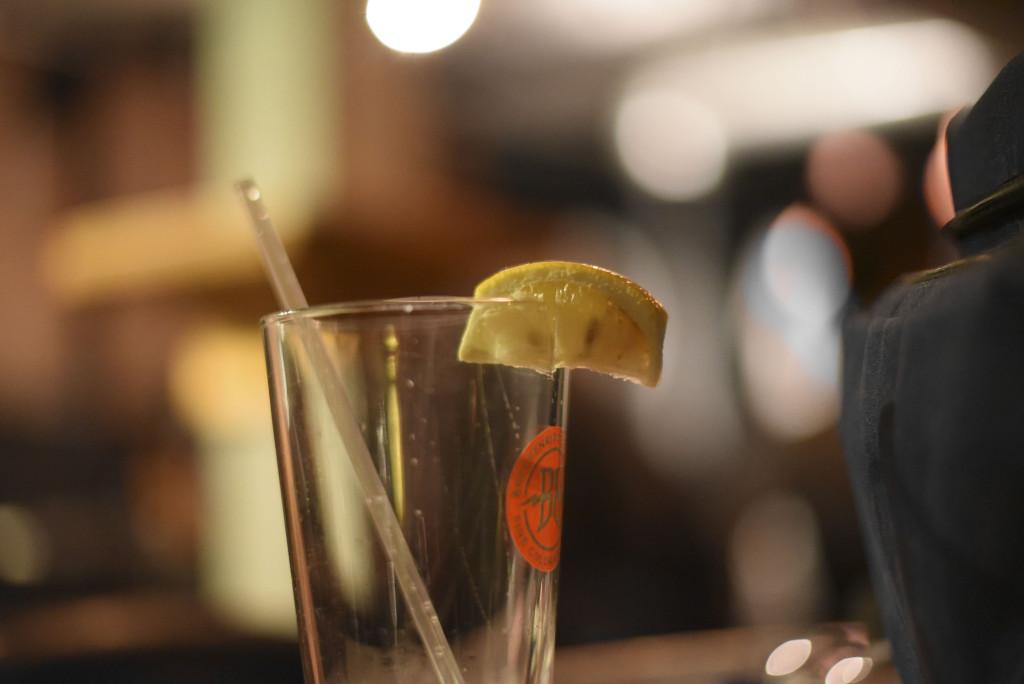
Sometimes, especially as the nights drag on, the crowd can be brutally unresponsive. Bits that landed just a few weeks ago are met with sparse chuckles. But tonight, the crowd is easy. Ruben, wearing an olive-green Teenage Mutant Ninja Turtles shirt, warms them up.
“Introverts aren’t born differently, they just never developed certain social skills. They’re not fully realized people,” Ruben says for a few chuckles. “If you’re an introvert, you’ve already decided, ‘Yeah, I’ve seen how most of the world operates, and I’m not into that. Unless it’s a gathering made up exclusively of my favorite people, I’m just gonna stay in tonight.’”
“And it’s not like I don’t get that! I’ve had that exact same thought,” he pauses, “when I’ve been incredibly depressed.”
The laughter isn’t great but he knows how to turn it around. He describes an extrovert’s perfect date: going out to a bar, meeting a new person, having irresponsible sex. He gets one “woo!” from the drunk heckler.
“Introvert’s ideal first date: uhhhh, the other person cancels and you stay home and read a book.”
He wins the crowd and the laughter picks up.
Geno’s main fear is getting up there and choking, forgetting everything. He’s been on stage before in his old band. But performing music with a group and being alone with a microphone, trying to make people laugh, are two very different things. He’s nervous, but not shaky.
Geno sits through the first two performers, and Ruben comes back to grab the mic, riffing on some of the material he just heard — A Ruben staple.
He brings up the energy in his voice. “Up next is a guy that I’ve only really known via Facebook, which usually only happens with girls I’m trying to have sex with, but in this case it’s just a guy who really wanted to come out and do comedy.”
He looks for Geno in the audience. “There he is! He’s coming out for the first time and is participating in the debate format, so let’s give a really warm welcome to Geno everybody!”
Cheers and applause emanate from the crowd as Geno moves up to the stage with his glass half full, a hoodie on over a button down. The two shake hands and Ruben skips off.
“Thank you!” Geno starts. “So, until Ruben clarified this earlier —” he sets his drink down on the ground, “— introvert/extrovert was the topic of the night, and I was prepared to talk about innies and outties, but uh, so I had a really killer 5 minutes on belly buttons so I had to chop these down on notecards, so bear with me.”
Not many laughs, but openers are tough. He looks over his notecards. He’s not concerned about the laughs, he’s concerned about looking confident. His posture is relaxed, his voice strong.
“You know that feeling when you’re just not in the mood to talk to somebody sometimes? That’s the way I am every single day.”
Geno says the worst thing in the world is to be out somewhere when you run into someone you know.
The laughter starts picking up. He has a good pace and an excitable demeanor.
With faux happiness, he mimics seeing someone: “‘Hey! What’s up? How you doin’?’”
“‘Hey, what’s up, how you doing’ is kind of a place-filler, until you figure out how the hell you’re gonna get out of this situation.”
The laughs get harder and he gets a few claps.
“I’m gonna start doing — when I run into someone I know — I’m just gonna say ‘OK then! I saw ya! Have a good one!’”
He hits his stride, getting his loudest laughter. He jokes about his Chinese barber not being able to speak English very well, and moves into a bit about introvert-enabling technology.
“It’s all put us in better communication with each other, that’s the beautiful thing, but it’s really worked wonders for helping us avoid each other,” he sets it up, with a slight pause.
“I don’t think I’ve answered the phone in three years,” he says to laughs. “When the phone rings, I think, ‘This person is either a lunatic or there’s an emergency.’ Either way I’m not gonna answer that.”
He gets a small applause break. He feels good. The crowd is welcoming and his jokes are working. When he finishes and steps off, he continues to feel good. He’s shocked that he feels this way. He prepared himself for disaster, and it didn’t happen. He’s ready to go back up there and do it again.
For the most part, Geno’s material is clean, but there is no list of off-limits material in Ithaca, unlike some New York City shows, and the only thing needed to get up on mic is a vast supply of courage — typically aided by the liquid variety — and the ability to write your name on the signup sheet.
In Ithaca, Molly McDowell can lead off a set with
“Welcome to the trigger-warning comedy show,” standing timidly, stone-faced under the light, her right hand in her pocket, “I’m your entertainment,” eyes fixed downward, “and possibly the topic of discussion at your next therapy session.”
A waiting silence. She shifts. Her short, brown hair gleams from the lights.
“And if you don’t laugh, you’ll be the topic of discussion at mine.” She grabs a few scattered laughs.
“So my rapist, um,” she’s cut by more laughs. “That’s not a punchline, guys,” her steely expression lets a smile slip briefly by, and her eyes move upward.
She says her rapist played hockey at Cornell about a decade ago.
“He was the guy, who on the power play, they would put in front of the net to knock in the rebounds from other players,” she moves her weight from one leg to the other, “because he’s really good at forcing things into places people don’t want them to go.”
Laughter fills the room.
“Now, I also have to be honest,” Molly continues. “I didn’t tell the whole truth to the police when I went to them and told them what happened, um, because I told them that the reason that I didn’t actually want to have consensual sex with him was because he’s married. But the whole truth is that it’s also because he physically disgusts me.”
A few loud laughs and soft chuckles from the crowd.
“Because he’s gained a whole lot of weight since college. And you know that you’ve been reading too many, um, too many, uh, body-positive feminist blogs when you’re afraid of fat-shaming your rapist.”


